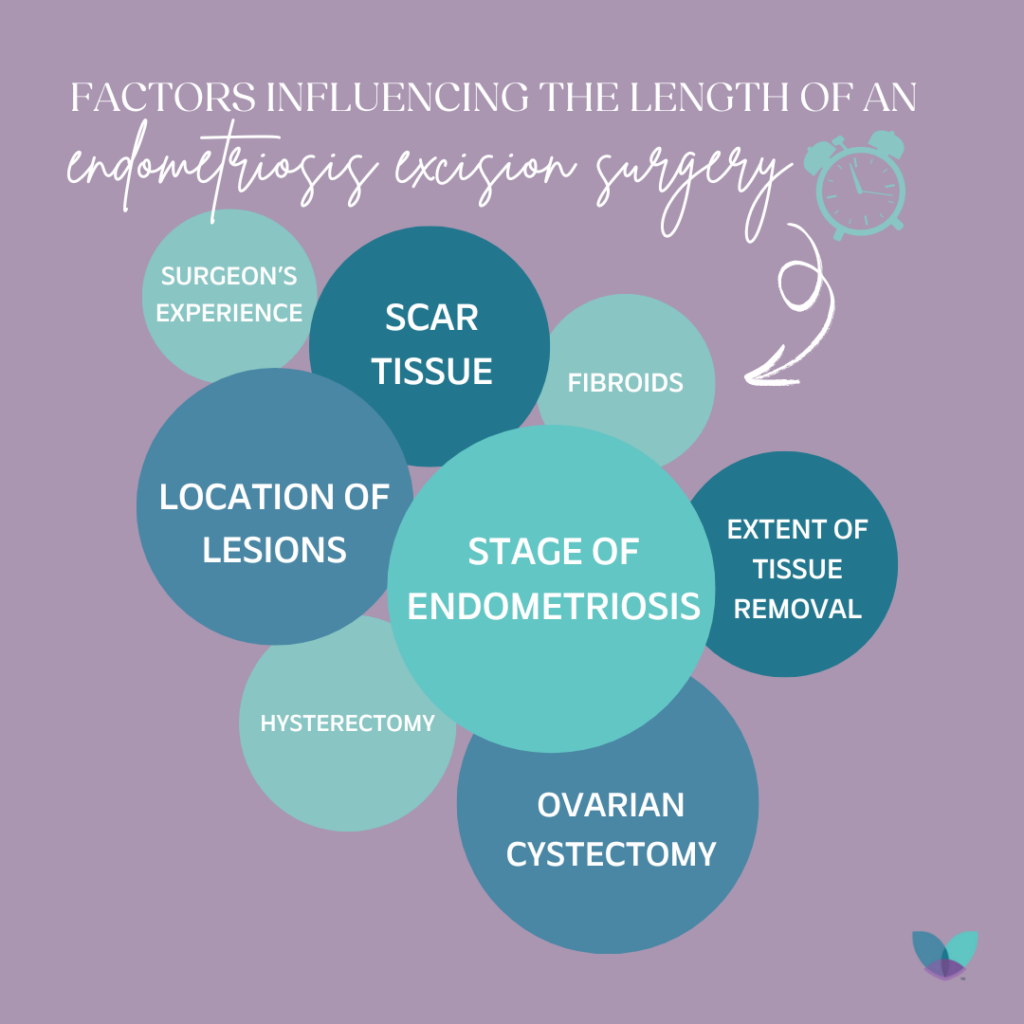With expert input from Dr. Madhu Bagaria, Endometriosis Excision Surgeon in New York and New Jersey

Endometriosis excision is a surgical procedure used to treat endometriosis, a condition where tissue similar to the lining of the uterus grows outside of it. Although this is a gynecological condition, it can affect other organs including bowels, bladder, diaphragm which makes this condition very complex and needs expertise.
The typical time for endometriosis excision is about 1-3 hours, however some surgeries can take longer due to a variety of factors.
Learn more about endometriosis excision surgery with PRM
Factors Affecting Length of Excision Surgery
Stage of Endometriosis
The severity of the condition, as classified by the American Society of Reproductive Medicine (ASRM), directly influences the duration of surgery. Later stages, known as deep endometriosis, often involves more extensive tissue involvement and requires longer surgical times.
Location of Endometriosis Lesions
The location of endometrial implants can impact the complexity of the procedure. Implants on organs like the ovaries, mesentery of the small and large intestine, diaphragm, around the nerve, bladder may necessitate more delicate surgical maneuvers.
Extent of Tissue Removal
The amount of endometrial tissue that needs to be removed can significantly affect the operating time.
Procedures That May Affect Excision Surgery
Adhesiolysis: If adhesions (scar tissue) have formed between organs due to endometriosis, the surgeon may need to release them, adding to the surgical duration. These adhesions can be very dense which can affect the plane between the organs and make the surgery more complicated.
Ovarian Cystectomy: If endometriosis has led to the formation of ovarian cysts, removing these cysts can extend the surgery.
Hysterectomy: In some cases, a hysterectomy (removal of the uterus) may be necessary, which can significantly increase the surgical time
Fibroids: Some patients may also have fibroids or adenomyoma which may need to be removed along with the procedure. These add to the operating room time.
Your Surgeon’s Experience Affects Your Excision Surgery
A surgeon with extensive experience in endometriosis surgery can often complete the procedure more efficiently, potentially reducing the operating time.
An endometriosis excision surgeon with a history of complex cases and multiple surgeries completed is important for achieving the best surgical outcomes.Your endometriosis excision surgeon should have performed multiple complex excision cases, have a deep well of training and education, worked with other excision surgeons, and have a team that fully supports the surgeon and patient before, during, and after surgery.

Download Your Free Guide: Choosing An Endometriosis Excision Surgeon
A Patient’s Individual Factors Affecting Surgery
A patient’s general health and any pre-existing conditions can influence the operating time. Patients with underlying health issues may require additional precautions or procedures, which can prolong the surgery. An example could be obesity, which can make anesthesia difficult, as well as surgery.
Unexpected Findings
During the surgery, the surgeon may encounter unexpected factors, such as extensive adhesions , which can lead to longer operating. If unexpected diaphragm disease is encountered, the tube used for ventilation will need to be swapped, the positioning of the patient is changed and these can add to the operating room time. Sometimes the tissues are inflammatory and can bleed on slight touch. These things can make surgery complicated.
Complications
While rare, complications can arise during surgery, such as bleeding or damage to nearby organs, which can lengthen the procedure and potentially require additional interventions.
Finding The Best Endometriosis Excision Surgeon
For many endometriosis patients, excision surgery can be a crucial step toward relief and recovery. However, choosing the right surgeon is often a daunting and overwhelming task.
With the lack of standardized information and the varying expertise of healthcare providers, patients can feel lost in their journey to find effective treatment – but we’re here to help. Schedule your appointment with an endometriosis excision surgeon to discuss your symptoms and past medical history.
